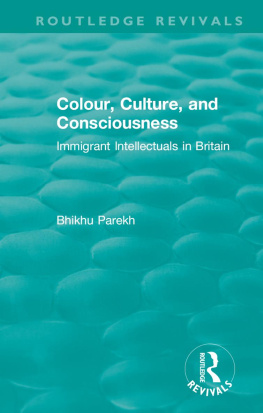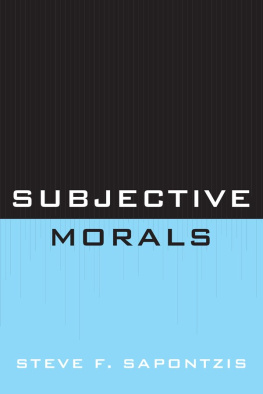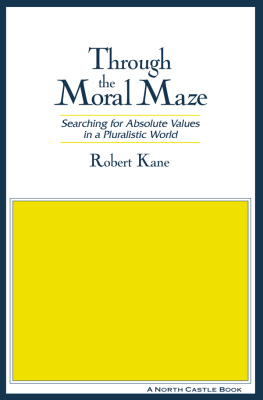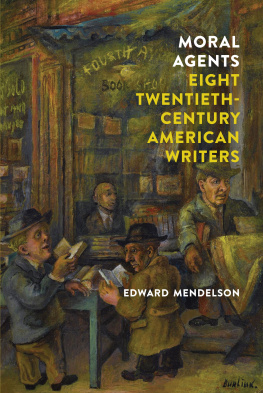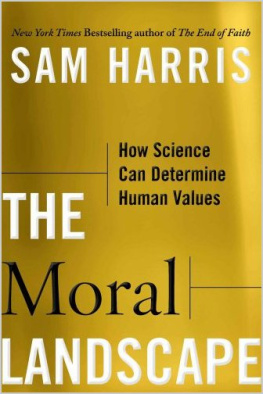The Good Life
The Moral Individual in an Antimoral World
Cheryl Mendelson

For Edward
CONTENTS
This is a book about the moral mentality, a distinctive mind-set that underlies key elements of Western culture and much of modern world culture. It concentrates on aspects of this mentality that, I believe, particularly need attention today and shows how they fit into a larger picture that I have drawn here only in outline. The subject could fill a much longer book, in fact whole shelves of books, but a short one works best to present the big picture that it strives for.
Its subject is a dauntingly difficult one. The very word moral has multiple ambiguities, and its several meanings open out into vast complexes of thought, feeling, and action. It can be legitimately approached from scores of different angles and levels, yet because it is highly charged, unfamiliar approaches often inspire fury, condescension, or offense. Morality interweaves reason, knowledge, instinct, intuition, and emotion in an intricate network of personal, historical, and cultural patterns. Books and essays about morality thus often seem guilty of overemphases and underemphases. The nature of moral concern itself acts as an obstacle to adequate descriptions of it outside those in novels and poems. Moral concern ordinarily functions as a dimension or a valence of thought, not as its focus. Thus any head-on approach to the subject tends to sound slightly false or off simply because it forces us to center attention on things that properly form part of the receding background of consciousness.
But perhaps the biggest problem for any contemporary writer about morality is that decades of contention about values have resulted in such a thorough politicization of the subject that the term itself suggests a variety of unpleasant political subtexts. How this has happened, and why it must be undone, is a central theme of this book. But given that the political Right has now falsely claimed morality as its turf, the reader might find it useful at the outset to know that I have always favored labor unions, strong regulation of business and finance, universal healthcare, abortion rights, sexual and racial equality, and gay rights, and that I oppose the death penalty and most military adventures; however, in matters of private and family life, some of my views lean in directions that tend, often misleadingly, to be labeled conservative.
This book is written for people who have the moral mentality, and it describes things they are already familiar with: how they themselves think, feel, and act; the increasingly strong antagonism to morality, or antimoralism, in our culture; the false moral pretensions of ideologues who are actually pseudomoral and antimoral. It is a book about the obvious addressed to the convinced. But when denials of the obvious are loud enough, a book like this has its place.
The book is not neutral. It presents a sketch of some of the things that morality is in both its personal and social dimensions, but it does so for moral purposes. Thus it offers a morally charged description of phenomena that historians, sociologists, biologists, anthropologists, psychologists, neurologists, and other experts, all in their own ways, attempt to describe factually and noncommittally. This book, that is, tries to isolate some characteristics, strengths, and vulnerabilities of moral thinking and acting that matter now morally.
The subject matter will raise in readers minds the questions of who on earth could be qualified to write such a book and why it got written. These are legitimate questions, and the only possible answers are not reassuring. As a work of moral observation, this book is necessarily an amateur work for the reason that there is no such thing as a moral expertno holy men or women, no seers, no scientists, scholars, or philosophers who by virtue of their professions know the right answers. No academic training exists that produces wisdom or goodness in its students; the best moral judges are certified by no boards and pass no qualifying exams. Knowledge and intelligence are sometimes vital to good moral judgment, but if the question is moral, the boundaries of the answer are always going to be wide, fluid, and human, not narrow or technical. Morally speaking, once we are adults, we are rarely justified in setting aside the responsibility to judge for ourselves and relying instead on what some trained or blessed individual tells us is right. The people we rely on for advice when we are troubled and uncertain are merely other people like ourselves on whom circumstance, upbringing, moral effort, or experience may have bestowed insightinsight that they may or may not be able to put to use in their own lives. Moral judgment always addresses the question What should I do? but sometimes good judgment fails to lead to good action.
This is a work of moral reflectionan essay, not an empirical studybut it is not a book of moral advice except in an attenuated sense. To write it, I had to overcome a sense of my own limits, moral and otherwise, and I managed to do so only because wiser people than I persuaded me that many readers would find the ideas in it helpful and encouraging. Its themes have been a lifelong preoccupation, inspired by events that rendered its questions a matter of urgent interest and provided unusual personal and academic opportunities to grapple with them. I will give a nutshell account of these events here because moral reflection draws upon the whole person in ways that mathematics, physics, or carpentry do not, and readers are entitled to ask who is talking.
THE ROOTS OF this book extend back to three dislocations in my life, one in adolescence, another in my first professional career as an academic, and another in my second professional career as a lawyer. I spent my childhood on a small farm in the Appalachian southwest corner of Pennsylvania. The closest big town, Morgantown, West Virginia, was about thirty miles south. This was a world of hills, coal-mining towns, and farms, with an odd mixture of people, some of them early-twentieth-century immigrants who came to work the mines and some men like my father, descendants of the first settlers in the region, borderlanders, as historians call them now, from southern Scotland and northern Ireland and England who arrived in the 1760s. These people took part in some of the fiercest, cruelest fighting of the American Indian Wars and were hot-blooded Revolutionaries. When the Revolutionary War ended, they launched the Whiskey Rebellion. Later, they were eager participants in each of the nations wars. They were always wholehearted fighters, with contempt for Quakerish pacifism. Yet, like the Quakers, they had the special psychology that I call the moral mentality, with the special moral capacity for self-reflection and self-criticism.
Many people in my childhood world spent their lives in what amounted to a moral quest. This was not something they talked about or, I imagine, consciously thought of, and it rarely assumed any heroic form. Nonetheless, they attempted to shape their lives by strongly felt moral imperatives, even if they avoided churches and even if they were not models of sober respectability. Envy, drunkenness, lust, dishonesty, and general crankiness were often more visible than uprightness. Even so, their lives had a moral substrate that gave them a characteristic outlook and led them to regard wealth, fame, and power as illegitimate, though tempting, goals. Sometimes these attitudes flowed out of resentment, but mostly they emerged from a strong egalitarian instinct that their moral sensibility dictated.


